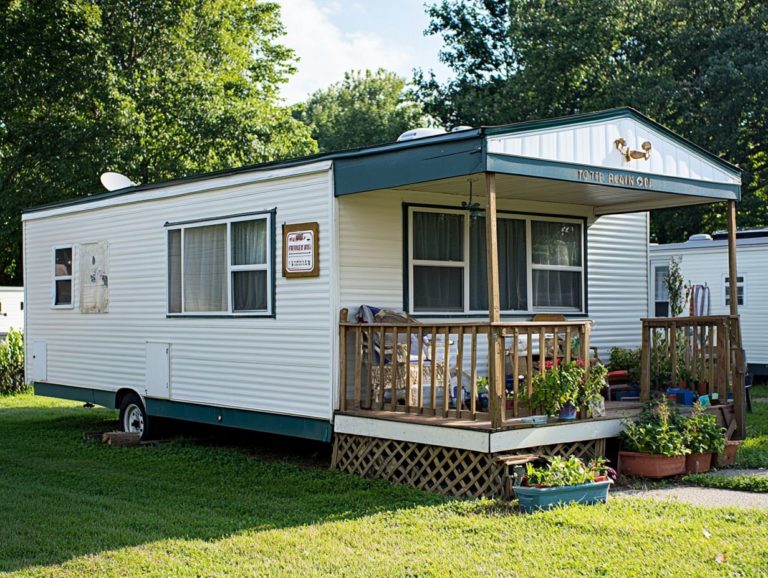Can You Transfer Home Insurance When Selling?
Transferring home insurance during a property sale may seem complex, yet it s an essential process that many homeowners often overlook.
As you navigate the intricacies of selling your home, understanding what it entails to transfer your insurance policy along with the associated benefits and drawbacks is vital. This article outlines the steps for a seamless transfer, explores available options, and underscores key considerations you should keep in mind.
Whether you find yourself in the role of the seller or the buyer, being well-informed empowers you to make wiser decisions throughout the transition.
Contents
- Key Takeaways:
- Understanding Home Insurance Transfers
- Transferring Home Insurance During a Sale
- Options for Transferring Home Insurance
- Considerations Before Transferring Home Insurance
- Frequently Asked Questions
- Can You Transfer Home Insurance When Selling?
- What is the process for transferring home insurance?
- Do I need to transfer my home insurance when selling?
- Will there be any additional fees for transferring home insurance?
- What happens if I do not transfer my home insurance when selling?
- Can I cancel my home insurance after moving it to the new owner?
Key Takeaways:

Transferring home insurance is the process of changing the insurance policy from one owner to another during a home sale. It’s possible in some cases, but not always. It’s important to understand the benefits and drawbacks before making a decision. Options for transferring home insurance include transferring to the new owner or keeping the policy and adding the new owner. Consider policy restrictions and potential cost changes before making a decision.
Understanding Home Insurance Transfers
Understanding home insurance transfers is essential for homeowners like you who are selling their property and aiming to protect your investment while transitioning to a new home.
Understanding your insurance claims and ensuring that your homeowner’s insurance policy aligns with the requirements of your new residence can greatly influence both your experience and that of the new buyer.
Key aspects such as the cancellation process, the logistics of transferring home insurance, and evaluating insurance costs are important for a smooth process.
Grasping these elements is crucial for a successful transition in your home insurance coverage.
What It Means to Transfer Home Insurance
Transferring home insurance means moving your existing homeowners insurance policy to a new property or adjusting it to provide additional coverage for new owners. This process is often essential when you relocate or sell your home, allowing you to maintain your coverage and avoid any potential gaps.
Typically, you should reach out to your insurance provider soon after changing your residence, sharing important details about the new property, such as its value and any unique features it may have. The insurer will assess the risks associated with your new location and adjust the policy terms accordingly.
This thoughtful approach ensures that you, as the new owner, are adequately protected against potential hazards like natural disasters or theft, all while keeping efficiency and cost-effectiveness in mind.
Benefits and Drawbacks
When weighing the benefits and drawbacks of transferring your home insurance, it’s crucial to evaluate how this choice affects both your financial obligations and your overall coverage.
Benefits might include continuity of coverage and potential discounts from your insurance provider. Drawbacks could involve increased insurance costs or the loss of specific policy features. By assessing these factors, you can make informed decisions that align with your insurance needs.
The ease of transition often stands out as a significant advantage, as many insurers facilitate a seamless move from one policy to another without gaps in coverage, providing you with peace of mind.
Look for potential cost savings through bundling policies or loyalty discounts, allowing you to lower your premiums.
However, it’s essential to consider any additional costs that may come with upgrading coverage or opting for higher deductibles the amount you pay out of pocket before insurance kicks in as these choices could limit your financial protection in the event of a claim.
Certain types of damage or incidents might not be fully covered under a new policy, leaving you exposed.
Ultimately, a balanced analysis of both the pros and cons gives you the power to secure the best possible protection for your home. Don t leave your home vulnerable understand how to keep it protected!
Transferring Home Insurance During a Sale
Transferring home insurance during the sale of your property is a strategic endeavor. It demands meticulous planning. You may wonder, is home insurance transferable to new owners? Working closely with your mortgage lender and insurance company is essential to ensure seamless coverage for both your old home and the new one.
As a homeowner, grasping the intricacies of maintaining your homeowners insurance policy while accommodating the buyer s needs is vital. This often involves understanding and potentially adhering to the buyer’s insurance policy requirements. You may need to evaluate whether your existing coverage can be transferred or adjusted to meet the new homeowner s preferences.
When It’s Possible and When It’s Not

Understanding how home insurance works when you move is essential if you’re looking to sell your property while ensuring that the new owner remains covered.
Several factors come into play here. Specific policy stipulations may limit transferability. The type of insurance provider you re dealing with also matters, along with the unique relationship you have with your property. For instance, some policies might include clauses that prevent coverage from being transferred until the original policyholder s term is up.
Some insurance providers have their own guidelines that affect coverage transfer to a new buyer. This could significantly influence your negotiations.
By grasping these conditions, you can navigate the complexities of property sales more effectively. You ll safeguard your investment while ensuring that the new owner is adequately protected.
Steps to Take for a Smooth Transfer
To ensure a seamless transfer of homeowners insurance, follow these critical steps:
- Start by reaching out to your insurance provider to inform them of the upcoming change in ownership.
- Review your existing homeowners insurance policy thoroughly. Identify coverage specifics, exclusions, and any outstanding claims that might need attention.
- You must quickly understand how this transfer may affect your insurance premiums to avoid surprises! The new owners may bring different risk factors or needs, which could lead to adjustments in rates.
- Lastly, inquire about any potential refunds for unused premiums. This ensures you have financial clarity during the transition, making the process as straightforward as possible.
Options for Transferring Home Insurance
Regarding transferring home insurance, explore options that make the transition smooth and cater to your needs.
Transferring to the New Owner
Transferring homeowners insurance to the new owner can significantly streamline the transition process. It ensures that the property is safeguarded under the terms of the existing policy.
To initiate this transfer, notify your insurance provider about the change in ownership. The new owner should share essential details, such as the closing date of the property sale and any necessary adjustments in coverage tailored to their specific needs.
Both parties may need to complete certain paperwork to finalize the transfer. This ensures that insurance coverage remains uninterrupted. It s wise for the new homeowner to review the existing policy to confirm it meets their requirements. Discussing any potential alterations with the insurer helps prevent unexpected gaps in coverage.
Keeping the Policy and Adding the New Owner
In certain situations, you might opt to retain your current homeowners insurance policy while simply adding the new owner as an additional insured party. This approach offers flexibility and continuity.
By choosing this route, you can enjoy immediate coverage benefits, ensuring that both you and the new owner are protected in the event of a claim. However, it’s essential to weigh the implications of this arrangement. Adding a new owner could alter liability limits or risk assessment of your policy. Sticking with the original coverage may also mean adhering to existing terms and conditions, which could be less advantageous, especially if the property has seen significant changes or repairs.
It’s vital to assess whether this added coverage meets the new owner’s needs and expectations. Doing so can help you avoid potential disputes in the future, ensuring a smoother experience for everyone involved.
Considerations Before Transferring Home Insurance

Before you transfer your home insurance, weigh several key factors that could impact your decision, such as policy restrictions, insurance costs, and specific requirements that can vary from one property to another.
This careful evaluation will help ensure you make a well-informed choice tailored to your unique situation.
Policy Restrictions and Limitations
Understanding the policy restrictions and limitations in homeowners insurance is crucial for ensuring you have adequate coverage during a transfer.
Each insurance provider may impose specific stipulations that affect how you can transfer your coverage to a new residence. For instance, certain policies might require a change in premium based on the property’s condition, location, or market value, which may change your coverage.
Factors like the age of the structure, prior claims history, and even your credit score can also influence your options, limiting your choices.
Therefore, thoroughly review these policies if you’re considering a transfer, ensuring there are no gaps in protection and that your coverage meets your needs.
Potential Cost Changes
Cost changes associated with transferring homeowners insurance can significantly impact your financial landscape, whether you’re the seller or the buyer of a new home.
The nuances of these shifts are influenced by various factors, including the property’s specific location, which can dictate regional insurance rates based on local risks.
For example, if you’re eyeing a home in an area prone to natural disasters, expect a higher premium. The type of property also matters whether it’s a single-family residence, a condo, or a multi-family unit; it will affect the coverage needed and, ultimately, the premiums you’ll face.
Understanding the insurance premium structure and how these elements interact is essential for anyone navigating the complexities of home buying or selling. Now is the time to evaluate your coverage needs!
Frequently Asked Questions
Can You Transfer Home Insurance When Selling?
Yes, you can transfer your home insurance policy to the new owner when selling your house.
What is the process for transferring home insurance?

The process for transferring home insurance involves contacting your insurance provider and informing them of the sale. They will guide you through the necessary steps and documentation needed.
Do I need to transfer my home insurance when selling?
While not mandatory, it is highly recommended to transfer your home insurance when selling your house to ensure that the new owner is protected by the policy.
Will there be any additional fees for transferring home insurance?
Some insurance companies may charge a small fee for transferring home insurance, but it is typically minimal. It’s best to check with your provider for their specific fees.
What happens if I do not transfer my home insurance when selling?
If you do not transfer your home insurance when selling, the new owner will need to purchase their own insurance policy. This can result in a gap in coverage and leave the new owner vulnerable in the event of a claim.
Can I cancel my home insurance after moving it to the new owner?
You can cancel your home insurance after moving it to the new owner.
Wait until the sale is finalized to avoid any coverage gaps.
Don’t leave yourself unprotected! Cancel your home insurance only after the sale is complete.




